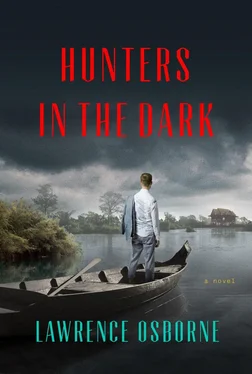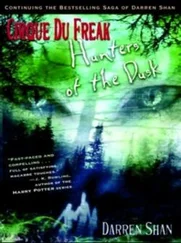“He was a doctor for the Khmer Rouge, if he didn’t tell you. He didn’t choose to be — he was only thirty at the time. They overran his clinic and he had the choice to work for them or disappear. He chose not to disappear. As people usually do.”
“It must have been a terrible experience.”
“Everyone has their stories. His is not the worst, believe me. He and my mother came out alive.”
“I’m glad they did.”
“Ah, are you really a flatterer, Mr. Beauchamp?”
“Not really. I mean I’m glad they’re alive.”
“Because they’re alive, I’m alive. Are you glad about that too?”
“Absolutely.”
“I’m hungry again. I have a place we can go and eat arepas .”
“What?”
“ Arepas . South American things. And mojitos. Arepas and mojitos.”
He thought that sounded excellent.
“OK. We’ll go South American.”
“Sí, señor.”
They walked back to the dusty and now-dark road and felt the cement dust on their lips. It seemed to be everywhere. The workers from the sites were walking through clouds of the same dust back to the main road, a long line of white eyes under the trees. It was like a street far out in the country, in the villages. The mulberry trees and the bats winging through them. She walked beside him with a soft apprehension, her bare shoulders inviting an initiative which he was too shy to take. They passed a school called the Chroy Chang Var, a tiled French building with a large garden. They wandered in for a moment to look at a curious circle of half-life-size mythological figures in the middle of the garden. They could feel bats and sleepy guards momentarily stirred in the shadows. She turned to him for some reason with an enormous smile. At the bend in the road the karaoke girls were still there sitting on plastic chairs and lit by the glare of their Galaxies. One could smell fields nearby, burning hay and rubber. They walked past the clubs until they were among weeds and low white walls, alone in the dust, and the city was just an orange glare above the treeline. She brushed against him and something in him flared up silently. He was about to take her hand when she said, “It’s not much of an English lesson, mistah.” He shook his head and they smiled and entered their conspiracy as quietly as two people entering a church by the side door in the middle of the night.
On the other bank of the river they found the China House and went in happy and sweaty and dusty and sat at the bar and ordered the long-anticipated mojitos with the arepas . It was an old Chinese shophouse with red lanterns and wooden floors, the bar alive with ice buckets and mint and miniature straw parasols. They rubbed the iced towels over their faces and a dark red dirt came off on the material. Within ten minutes they had sunk down the second round of mojitos and eaten the mint. Within twenty, they were in a world of their own.
They went upstairs and lay on one of the covered divans with their shoes off and ate curries and jasmine rice with gin and tonics. They hadn’t spoken for an hour.
“Shouldn’t you be back?” he finally asked.
“No, we’re going to Pontoon. I’m taking you to Pontoon. It’s where the bad boys go.”
“Are we bad boys?”
“We’re not bad or boys. But we’re going to Pontoon anyway.”
He looked at his watch and then remembered it wasn’t there and she noticed the odd gesture.
“You don’t have a watch,” she cried. “But you looked for it. That was quite cute.”
“Strange — I must have left it at the hotel.”
“Really? Maybe you don’t have one, Mr. Simon.”
“A man without a watch,” he muttered. “Disreputable, eh.”
“It’s better not to have one in this town. It’ll get you into trouble. You should leave it at home every night from now on.”
“All right, I’ll take your advice.”
Her foot had crossed over to his side and touched his. They were slipping downward and the Chinese screens around them blurred in his vision. An hour later they were in a tuk-tuk to Pontoon, a fresh and bright rain falling all around them.
Outside the club was a small crowd of Khmer drivers. They pushed their way to the doors and the bouncers nodded them through after glancing at Sophal’s ID. At the end of a dark corridor lay an immense horseshoe bar with sofas around it. They danced for a while, Sophal raising and lowering her arms with her fingers extended in the positions of classical Khmer dance, and then they sat at the bar among the punters and the girls on the make and the waify NGO men who moralized by day and picked up girls by night. She ordered a bottle of white rum and they drank that with huge pieces of ice and Coke and watched the aid workers and diplomat staffers from India and Africa and Europe elided into a great pleasure-seeking confusion which the Khmer girls preyed on with a nimble awareness of the smallest advantage and disadvantage. It was amusing for an hour. But without a watch, he reflected, there was no way of knowing how long it was amusing for. When they came back onto the street, in any case, it felt much later. The streets had gone into that delicious comatose state of the late nights, the pavements given over to noodles and fried squid and cats, the tuk-tuks moving through the rain more silently. The desultory, lazy atmosphere of sex and loose ends and straying curiosity. There was no violence in the air at all, just a rambling sense of restlessness and anticipation. Soon, later still, the street people would come out of the shadows, the scavengers and sweeps and drifters who sifted through the city’s rubbish and detritus in the hours before dawn, but they too had a listless gentleness.
He offered to walk her home to her parents’ house and as they walked along the boulevards the lights went out again and the roads filled with their indolent floods. They came to the gates and she said, “We could go to Colonial Mansions instead — for a bit. I’ll tell Daddy we couldn’t find a driver with the blackout.”
Robert went along with it and they went back down to the boulevard and found a tuk-tuk who could be reasoned with. The lightning now came down in clearly visible forks but as yet there was no sound, no audible threat.
In his room they took off their clothes solemnly although there was no light to be had and no fan or cooler. He ran a cold bath and they lay in it for a long time. She had gone into his miserable kitchen and found some coffee grounds and mixed them with milk and brought the paste back into the bathroom. As they lay in the cool water listening to the rain she rubbed the coarse grains into his back, his shoulders and his arms, then his hands and fingers, filling every crevice of him with the mixture. Then she told him to do the same with her. He scooped the paste into both hands and then spread it across her back making it dark, then her tiny arms and the back of her neck. When they were both coffee-dark and grainy they lay back in the water and smelled the coffee and the milk and the rising sweat mixed together. The rain had reached a furious crescendo and hammered now on the half-open windows and the roof garden above them. They went to the bed only half washed off, still reeking like a coffeepot, and lay down in the damp sheets and kissed until they fell asleep for a while.
Even when they woke they were not entirely in the world. The rain had stopped and a vast, anvil-shaped cloud had taken form above the city. At its center, emerging hour by hour and with a ghostly uncertainty, a new moon finally forced its way into the picture. A halo surrounded it, a perfect circumference of surrounding atmospheric light. The cloud evolved around it also, frothy edges glowing with silver brightness. Inexorable and silent, it ballooned upward like a sign of terrestrial war, its black core unaffected by the moon. Watching its outer edge progress into space, the observer felt a subtle madness. Far down the river, in fact, on the banks of the Mekong, the men who worked on the river looked up and made predictions. Some said it was a sign of good things to come, an omen that could be trusted, but by far the majority sensed that it foretold something evil and unknown. They said it was a cloud of dogs and vultures.
Читать дальше












